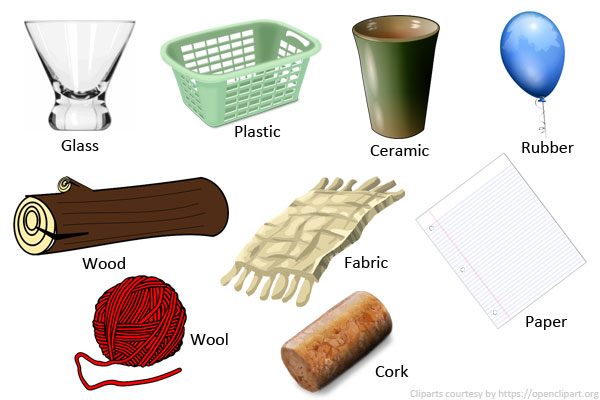This lesson is about conductors and insulators. Learn about lists of heat conductors, lists of heat insulators, lists of electrical conductors and lists of electrical insulators.

Examples of Insulators
We can define conductors and insulators in relation to heat and electricity.
Conductors can be heat conductors and electrical conductors. Insulators can be heat insulators and electrical insulators.
Heat conductors or conductors of heat let heat flow through them easily.
Have you ever tried to stir boiling soup using a metal spoon? If you have tried so, you know how quickly heat energy flows from the hot soup, through the spoon, to your hand. Do you remember; how your fingers began to get hot??? This is because heat travels faster through metal. Substances like metal are called conductors.
The movement of heat through a solid heat conductor is called heat conduction.
For example;
The metal spoon conducts heat from the hot soup to your hand.
Heat insulators or insulators of heat don’t let heat flow through them.
Let’s get back to our example.
If you have used a wooden spoon or a spoon with a plastic handle, you know how easier it is to stir the hot soup, by experience. This is because neither wood nor plastic conducts heat. Substances like these are called insulators.
Now you can understand that heat conductors and insulators can both be useful, but for different jobs. For example; the bottom of a saucepan may be made from a metal, like iron or aluminium, which lets heat flow quickly from the cooker to the food inside. But its handle is likely to be wooden or plastic. These materials won’t let heat flow to your fingers and burn them.
Heat conductors and heat insulators are also called thermal conductors and thermal insulators.
Electrical conductors or conductors of electricity let heat flow through them easily. Electrical conductors block the flow of electricity.
For Example;
Copper is a metal that conducts electricity well. Most electrical wires are made of copper.
Electrical insulators or insulators of electricity don’t let electricity flow through them.
Let’s get back to our example.
You know that most electrical wires are made of copper. But if you touch these wires you can get a shock, which is extremely dangerous. That is why all electrical wires are insulated with a plastic cover. Plastic is an electrical insulator. It does not conduct electricity at all. So you can touch the electric wire without getting a shock because of the plastic cover.